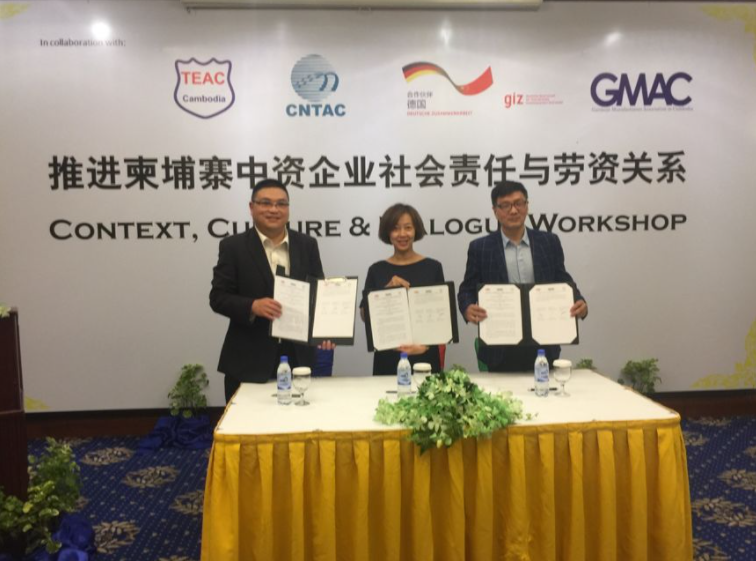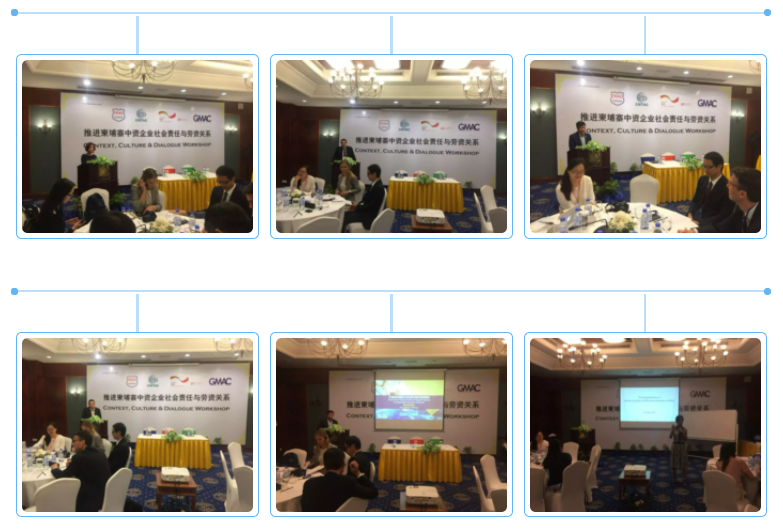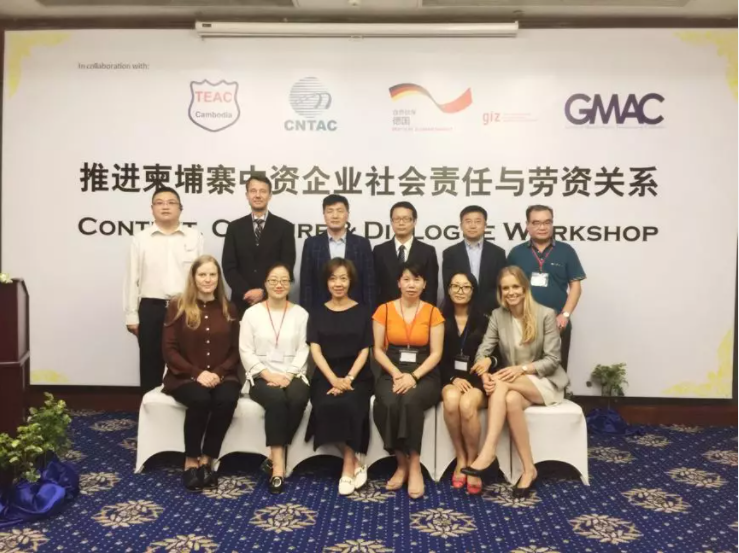From October 22 to 24, 2018, a series of trainings led by the Social Responsibility Office of China National Textile and Apparel Council - "Promoting Chinese-funded Enterprise Social Responsibility and Labor Relations Special Training" was successfully held in Phnom Penh, the capital of the Kingdom of Cambodia. This training event was jointly organized by China National Textile and Apparel Council (CNTAC), German Institute for International Cooperation (GIZ), Cambodia Chinese Chamber of Commerce (CCCC) and Cambodian Garment Association (GMAC), and was strongly supported by the Chinese Embassy in Cambodia . Yan Yan, Director of Social Responsibility Office of China National Textile and Apparel Council (CNTAC), Marc Beckmann, Director of SLSG Project of German International Cooperation Agency, He Enjia, President of Cambodia China Chamber of Commerce (CCCC) Textile Enterprise Association, and Secretary General of Cambodia Garment Association (GMAC) Ken Loo and other leading guests delivered speeches at the training session.

The training is part of the project "Social and Labour Standards for Textile and Apparel Industry in Asia" ("SLSG"). The project is based on the technical cooperation agreement between the government of the Federal Republic of Germany and the government of the People's Republic of China, as well as the "Bilateral Cooperation and Innovation Joint Action Framework" signed by the two governments on October 10, 2014, and under the guidance and support of the Ministry of Commerce of the People's Republic of China, It is actually implemented by China National Textile and Apparel Council and German International Cooperation Agency. One of the goals of this project is to establish a new standard for Chinese foreign invested textile and garment enterprises and to share and expand the international market application of CSC9000T.
Cambodia is located at the core of the Southeast Asian territory. It has a unique location advantage, as well as very good political conditions and economic advantages. In recent years, it has always been a hot spot for foreign investment, and the economic growth rate and economic growth rate have maintained high-speed growth for many years. China is the largest investor in Cambodia, and the three major industries China invests in Cambodia, the first is the textile and garment industry, mainly clothing and footwear production, processing and manufacturing enterprises. Cambodia is also a distribution center for processing of supplied materials, and Chinese enterprises tend to have absolute advantages. dominance. Director Yan Yan said that under the leadership of the China National Textile and Apparel Council, more and more textile and garment enterprises are investing in Cambodia, which is to implement the national strategy to promote the "Belt and Road", make full use of the two markets and bilateral resources, and carry out transnational operations to achieve Industrial upgrading and promoting economic and trade cooperation. Mr. Marc Beckmann, director of the SLSG project, introduced the status of the "Social and Labor Standards in Asia's Textile and Apparel Industry" (SLSG) project in Cambodia, and said that since the SLSG project was launched, countries including Cambodia, Bangladesh, Pakistan, Vietnam and China, In response to the challenges of different styles and cultural conflicts, we will carry out a dialogue and communication mechanism based on multi-party understanding, and will continue to support dialogue and regional cooperation in various countries to build a responsible and sustainable supply chain for the textile and apparel industry at the Asian level. President He Enjia and Secretary-General Ken Loo also expounded the preferential policies and important factors of Cambodia's textile and garment investment, including the rising demographic popularity, relatively low labor costs, tariff rates, political and legal environment and other preferential policies . At present, Cambodia has more than 700,000 industrial workers and more than 600 processing factories. The lack of local technology and materials, the highly liberalized market, the excellent business environment, and the active cross-border investment have attracted a lot of attention as an emerging market. It is hoped to strengthen cooperation with China National Textile and Apparel Council, improve the social responsibility management capability and management level of Chinese-funded enterprises in Cambodia, and set an example and an example for the sustainable development of Cambodia's textile and garment industry.

Cambodia is the first Southeast Asian country to accept an agreement with ILO. Trade union activities are relatively active, and the risk of social responsibility is relatively high, which brings great risks and hidden dangers to the overseas investment of Chinese-funded enterprises, and also has an impact on the development of Cambodia's textile industry. In recent years A number of Chinese factories were closed and transferred because they did not adapt to the country's policies, regulations and social responsibility management requirements in a timely manner. In order to let participating companies understand the latest corporate social responsibility development trends and avoid social responsibility management risks, Dr. Liang Xiaohui, chief researcher of the Social Responsibility Office of China National Textile and Apparel Council, conducted a global corporate social responsibility development trend and challenges to the Asian textile and apparel industry. Detailed interpretation and consultation on the "Guidelines for Responsible Overseas Investment of Chinese Textile and Apparel Enterprises". The "CSC9000T Textile and Apparel Enterprise Social Responsibility Management System" developed and revised by the Social Responsibility Office of China National Textile and Apparel Council will provide a package of solutions. , to promote the compliance management and sustainable development capabilities of enterprises.
Compliance management, cultural traditions and the influence of trade union organizations are the most important challenges for Chinese enterprises to invest overseas. For this purpose, the organizer of the event also invited relevant experts and professional trainers, Ms. Seltik HENG, Mr. KIM Pichda and Mr. In Meng. He gave professional explanations on popular topics such as the interpretation and application of labor laws and regulations in Cambodia, the legal establishment and protection of trade unions, the communication and cross-cultural management mechanism based on Cambodian culture, the protection of female workers and the promotion of female leadership.
In order to better improve the asset efficiency of overseas investment of enterprises, effectively reduce investment risks, improve enterprise management level, expand cooperation space, expand cooperation potential and sustainable development value. China Textile Information Center signed a memorandum of cooperation with the Cambodian China Chamber of Commerce Textile Enterprise Association and the Cambodian Garment Association in the presence of officials from the Chinese Embassy in Cambodia. According to the memorandum, the three parties have established a strategic partnership, which will enhance the awareness and capacity building of the social responsibility competitiveness of Chinese-invested companies in Myanmar, provide training on issues related to the social responsibility management system, overseas promotion of social responsibility systems such as CSC9000T, and social responsibility information disclosure. , key and difficult issues related to the field of social responsibility, etc. Based on this, the three parties will work together to promote a package of cooperation plans such as responsible investment, technology transfer, and professional training for enterprises of the two countries with responsible and sustainable development under the framework of the “Belt and Road Initiative” and the “Lancang-Mekong River Cooperation Mechanism”. Distill mature experience for promotion and replication.
China Textile Federation advocates and encourages enterprises that invest and operate under different cultural and institutional backgrounds to refer to and adopt the CSC9000T Textile and Apparel Corporate Social Responsibility Management System, strengthen cross-cultural management, and support and encourage Chinese-funded enterprises that "go out" to obtain local laws. It can also win the local social license, and make positive contributions to the sustainable development of the local society and economy.
2018 is the fifth anniversary of the "One Belt, One Road" initiative. In the past five years, China's textile industry has achieved fruitful results in "going out", especially in Southeast Asia such as Cambodia, which has played a strong supporting role in the construction of local industries, and will cooperate with domestic industries. The transformation and upgrading of the industry has generated positive interactions, and the construction of industry social responsibility has opened a new journey for enterprises to "go global" and assumed a new mission, providing a good dialogue mechanism, mutual benefit and win-win results, and stable and long-term progress. In the future, China National Textile and Apparel Council will assist Chinese-funded enterprises to solve the problems they face in the process of "going out" by means of guide development, system promotion, capacity building, industry network, local support, policy advocacy, international exchange and experience promotion. development challenges in areas such as social responsibility, labor standards and environmental protection.

